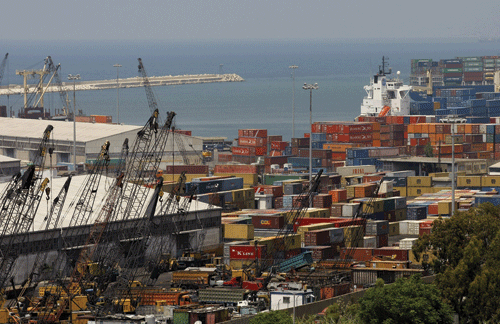The government’s endorsement of a plan to increase the minimum wage from LL500,000 ($333) to LL700,000 ($467), accompanied by salary hikes for those earning up to LL1.8 million ($1200), gave rise to a fierce cacophony of debate. The claims and counterclaims pit different interest groups against one another, with arguments that the government has gone too far, not gone far enough or simply gone the wrong way.
The impassioned reactions are predictable for the simple reason that this policy will directly line and lighten the pockets of employees and their employers, respectively.
The worker
Iktimal Halawi, an English teacher in an intermediate level school in Nabatiyeh, earns a monthly salary of LL580,000 ($387).
“This is absolutely insufficient for us to live off,” she says. Iktimal argues the minimum wage does not amount to a living wage, adding that, “We can say now we are already living at the minimum level.”
Halawi stands in a more fortunate position than many other employees on similar earnings. Her husband is an employee in a bank and takes home some LL1 million ($667) every month. The family home — where they live with their three young children — was also built before they were married, sparing them the burden of rent. “If we had to pay rent I really don’t know how we would live,” adds Halawi. Nonetheless, she claims it is a constant struggle to balance the books without dipping into the red.
Food bills alone consume nearly half of their monthly income and then they pay LL100,000 ($67) for electricity, LL70,000 ($47) for phones, LL250,000 ($167) for gasoline, LL150,000 ($100) for school transport and LL150,000 ($100) in school fees. Consumer goods are almost always purchased on credit and they currently pay LL100,000 ($67) every month towards their TV and washing machine. This leaves them with little left over for unforeseen expenses such as household repairs or medical expenses.
“If something unexpected happens then we have to take a loan from friends or family in order to manage,” says Halawi. “We depend a lot on friends and family and the extended community.”
Whilst low-income employees understandably call for a rise in their pay packets, many business owners have been quick to argue that the stipulated rise in wages will increase unemployment, thwart growth and exacerbate Lebanon’s already high rate of inflation.
The employer
Hussein Sabaagh opened his restaurant, Istambuli, in Hamra, Beirut in 1970. He rode out the tumultuous years of the civil war and then enjoyed a relatively successful period, but he is now struggling to keep afloat. “I cannot afford to pay them anything extra,” argues Sabaagh about his team of staff.
He says his monthly payroll expenses amount to LL30 million ($20,000), approximately 30 percent of his operating costs that also include LL2 million ($1,333) for electricity, LL1.25 million ($833) for rent and LL45 million ($49,333) for food and drink.
“There are no profits, only losses,” sighs Sabaagh, but he would only elaborate as far as saying; “let’s just say times are hard.”
Amongst his staff he has five employees on minimum wage and the highest paid member of staff takes home LL1.5 million ($1000) every month. As such all of Sabaagh’s employees will be affected by the new wage legislation, which stipulates an increase of LL200,000 ($133) for those earning less than LL1 million and an increase of LL300,000 ($200) for those earning between LL1 million ($667) and LL1.8 million ($1,200). He argues that enforced wage increases would result in him having to close the business; his staff would not be earning more but rather they would be unemployed.
Sabaagh says he believes that it would be near impossible to recoup the extra costs incurred by charging his customers higher prices because they are already too high.
“The food is already expensive, if I increase the prices then who is going to come and pay?” he asks.
The informal sector
Whilst the calculations regarding a rise in the minimum wage by low-income employees and their employers are relatively straightforward, the considerations for those working in the informal sector are no so clear-cut.
“This talk of increasing the minimum wage is a sin. You enter into a vicious circle; you take the increase but you have to pay for it because prices also rise, so in the end your standard of living doesn’t increase,” argues one low-paid worker who wanted to remain anonymous.
As an employee in a printing press that is not registered with social security his employment is off the record, and consequently his income of LL1.5 million ($1,000) per month is out of the purview of the state. His wife, who also asked not to be named, works as a house cleaner.
“I can take between $30 to $35 (LL45,000 to LL52,500) in a day but I won’t benefit [from an increase in the minimum wage] because I am self-employed,” she points out.
The couple claim their combined income is just enough to cover essential expenditures for their life in Beirut’s southern suburbs. Their primary concern is that an increase in the minimum wage will translate directly into a rise in prices. As they would not be protected by any stipulated wage increases, a hike in prices would in real terms amount to a fall in their standards of living. The inflationary pressures of a higher minimum wage are clearly a concern for policy maker and house cleaner alike.
Her husband agrees that it is important to increase the standard of living for low-income earners, but frets that a higher minimum wage would actually harm many of the most vulnerable members of society. As an alternative method to ease the financial burden felt among the poor and vulnerable he argues for a more progressive tax system: “Get rid of the indirect taxes such as the taxes on petrol or other fuels. Someone who earns millions of dollars pays the same for a tank of petrol as me. There should be more direct taxes on people’s incomes.”
The government
As with any new laws it is their enforcement that determines whether they will have any meaningful impact. This is not an issue with regards to the public sector in the case of the new minimum wage legislation, but the state’s ability and determination to enforce the new wage levels in the private sector is not so clear.
“There are lots of companies now that are not paying the minimum wage,” says the printing press worker. “You can take or leave the wages because there are plenty of others who will take your place.”
Sabaagh, from Istambuli Restaurant, reasons that the problem is not just a case of ineffective government enforcement but also an unhealthy and distrusting relationship between the citizen and the government.
“In other places the citizens are loyal to the state and the state is loyal to the people and therefore there is honesty,” he argues, before later adding, “sometimes when you are honest it is like grabbing hold of burning embers.”
In view of these conflicting interests it is little surprise that the government was berated from all quarters when it unveiled the new minimum wage legislation. With business leaders and various factions of the labor movement challenging the proposals, albeit for different reasons, the lawmakers seem to have made few friends with the new wage proposal.









